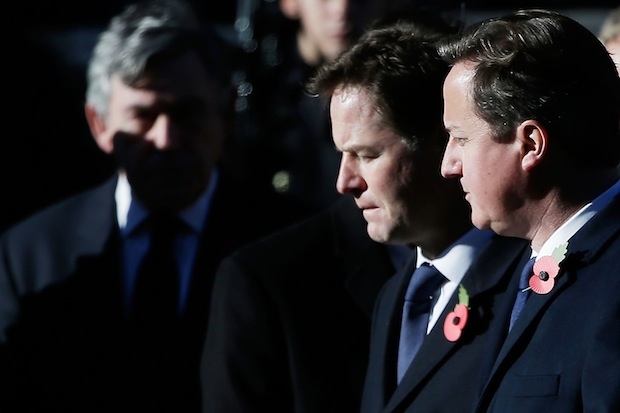It may come as a grave surprise to you that, when it was offered as a prize in a charity auction, the opportunity to attend a dinner lecture by the former prime minister Gordon Brown failed to reach anywhere near the sum the organisers had expected. Particularly so as the prize promised, as a special treat, the chance to join Gordon for dessert. You would imagine there would be literally millions of people who’d jump at the chance to sit next to Mr Brown as he glowered over his ice cream, to which he had applied copious amounts of salt, totally silent except for the occasional sotto voce murmuring of ‘bigot!’ Or perhaps just sitting there with that terrifying mirthless smile he used to flash on and off at entirely random moments, like a faulty neon bulb in the deserted waiting room of a failed dentist.
But oddly, no. People were not queuing up. They were not prepared to fork out. The organisers estimated the value of this reward at £1,225, possibly more if Mr Brown, in one of those catatonic furies, actually assaulted you with the pepper pot. I don’t know where they got that figure from. Who can put a price on something like that? The second best prize at the auction was a video compilation of Douglas Alexander’s appearances on the BBC Question Time programme, with background music provided by the Lochaber Ladies Fife and Drum Band performing a selection of works by the late Karlheinz Stockhausen. Possibly, or maybe not. I’m just guessing there.
I read about the charity auction in the Times and the gist of the piece was that Gordon has somehow, sadly, slipped away from us. He is never to be seen, he has become a sort of non-person and all we have to console ourselves are those precious memories. Just occasionally he resurfaces, as when he made a rather good speech about Nelson Mandela in the House. But this only reminded us that few prime ministers can have disappeared quite so utterly as Mr Brown, except maybe for those who died in the job.
We have heard recently from both Messrs Blair and Major; indeed it is a rare week when we are not privy to some money-making enterprise of Blair’s, or some fatuous statement about how we have to intervene somewhere it is no business of ours to so do. Margaret Thatcher was still a regal and often uncomfortable presence for her party until not long before she died, and Jim Callaghan set up forums, attacked his own party (over nukes, naturally) and became Father of the House of Commons. His end was scarcely less ignominious than that of Gordon Brown’s, nor his tenure much different in its brevity — and like him, he was one of only three postwar prime ministers not to win a general election. But Sunny Jim kept stamping around, increasingly distressed at the direction in which his party was headed, and he was usually afforded a favourable press. You could not say the same about Gordon.
And so Brown has continued as a fairly diligent backbench MP while occasionally earning a tidy few bob through public speaking contracts, although commanding nothing like the sort of money either Blair or Thatcher could hope to pull in. Every penny to his company, he says, nothing to him personally. There was one big earner — for the US hedge fund monkeys Alphametrix, which reportedly brought in £48,803 and thoroughly annoyed the left of his party, never terribly keen on Gordon’s apparent affection for (and deregulation of) the financial sector.
In the public mind, his occupation of 10 Downing Street seems, in retrospect, a sort of ghastly anomaly, something none of us wanted and indeed something none of us were given the chance to vote on when it happened. It is difficult to comprehend a time when he was genuinely regarded as having performed with some adroitness during the early stages of the financial crisis (and even as having ‘saved the world’, a benediction bestowed upon Brown by, er, himself and which he later dismissed as a ‘slip of the tongue’ or maybe ‘slip of the hubris’, whatever). But no matter how much you might disagree with the policies he pursued, from the left or the right, it was not policy which has led to us regarding the man as a catastrophe. The reason was that most sane people in this country would pay good money not to sit next to him for dessert, and still less hang around while the cheese was served. There was a lowering darkness about the chap, an air of paranoia. As was repeatedly pointed out by his political enemies — the dispossessed Blairites, of course — he seemed to find it impossible to connect with people at the simplest level and the increased requirement for him to do so, as the 2010 general election drew nearer, made him appear all the more awkward, and the attempts at homeliness all the more a charade.
So this is perhaps why politics today is so fantastically vapid, so ephemeral, so lowbrow. Gordon Brown was the last British prime minister who believed he could get away with being serious and aloof; it is why, today, our politicians are continually dogged by questions about how they relate to ordinary people and must answer banal enquiries about everything from the price of milk to their favourite pop group. It is why they play along, determined to be interminably personable and human, no matter how witless they might appear.







Comments